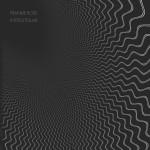
Frankie Rose Interstellar
(Slumberland/Memphis Industries)
Interstellar is the latest release with Frankie Rose’s name in the credits, and it is also the only one that can truly be called her album. She had a brief stint with Dum Dum Girls, longer ones with Crystal Stilts and Vivian Girls (where she penned the group’s best song, Where Do You Run To), and top billing on her record with The Outs just two years ago. Interstellar sounds nothing like any of those bands, even Frankie Rose and the Outs. Instead, we have a much more atmospheric, relaxed album that delves in chillwave, pop, and ‘80s dance-rock that, unfortunately, fails to transcend such influences.
Perhaps the biggest issue with Interstellar is the lack of variety that it displays. Of the ten songs, at least eight share a traditional pop structure of verse, chorus, and bridge, which would not be a weakness if not for the fact that openings on almost every song are fronted by a kick/snare drumbeat and synth, the chorus merely a loud extension of the verse where Rose multi-tracks her voice to make up for a lack of power, and bridges fail to take the song anywhere new. Rose’s compositions focus instead on atmosphere and luscious production rather than strong melodies and good hooks; the result is an often-times monotonous but never unpleasant half hour of music. Songs ignore dynamics in favor of a blended wave of sound, most are devoid of any form of tension, and rarely do any utilize Rose’s hypnotic voice to its fullest, preferring to blend it into the wall of synths. The overly cautious production obscures Rose’s lyrics and voice too often and strips the songs of any emotional conveyance. As a result, the album sounds familiar far too quickly.
When Interstellar hits, however, it hits hard. Moon In My Mind plays with Rose’s voice, matching it to the eerie sound of her guitar, and utilizing multi-tracking not as a cover-up for vocal power, but for emotional embellishment. Night Swim features two different guitars trading off distorted knocks with cleaner, warmer flourishes, and The Fall makes great use of strings, allowing them to carry the song to its natural highs and lows. A few of these songs replace (or at least add to) openings consisting of simple drum patterns and two or three note synth drones with driving bass lines that are effective, assuming they don’t get lost in the processed collage of keyboards, guitars, and vocals that hit a bit too hard. Rose’s harmonies, too, are effective, elevating the multi-tracking from substitution or compensation to genuine, self-fulfilling purpose. At such times, when Rose shows confidence in her voice and her compositions, her work is most effective. When similar intros, structures, and soundscapes reign, her work may be pleasant, but it is also repetitive and sleepy. But when Rose takes a chance, allowing real melodies and subtleties to come to the surface, we regain interest. Still, her best weapon is her voice, hidden far too often even when she has total control. The strengths poke through, sometimes one or two at a time, sometimes all at once, but never for long enough.
On Pair of Wings, a minimalist track that is nonetheless tied for the album’s longest, Rose creates tension with just her voice and her lyrics. When she tells us, “All that I want is a pair of wings to fly/into the blue wide open sky/show me your scars I’ll show you mine,” we are finally starting to see those scars, and as a result, consider our own; she has finally done just that and revealed the emotional power of her songwriting. With the effortlessness that Rose can create tension, exploit familiar structures, and generate a genuine feeling, we know that she can fly as high as she wants on those wings as soon as she finds the confidence to try. And we’ll be right with her, even if right now, she sometimes struggles to get off the ground, let alone go Interstellar.
23 February, 2012 - 15:57 — Forrest Cardamenis